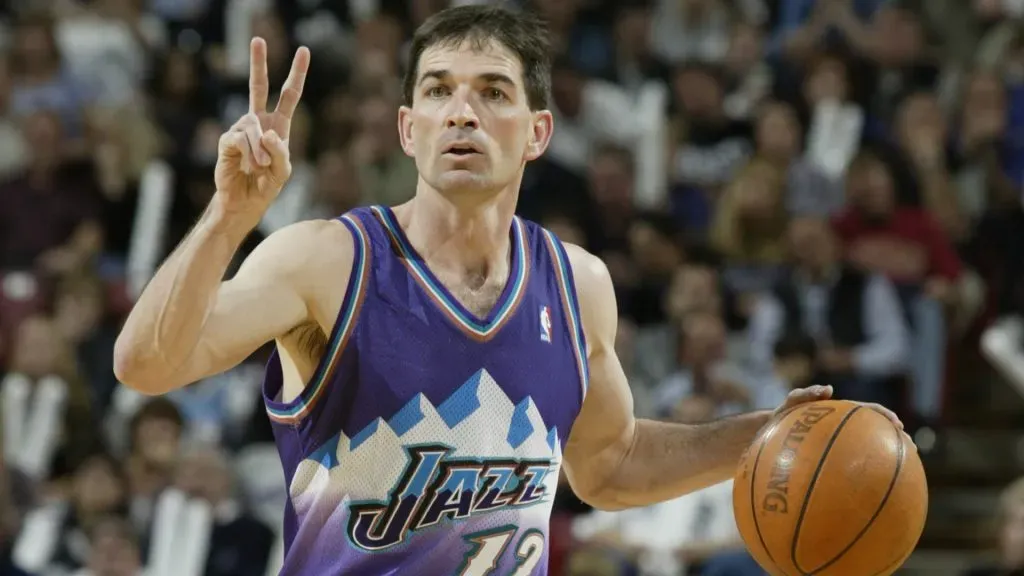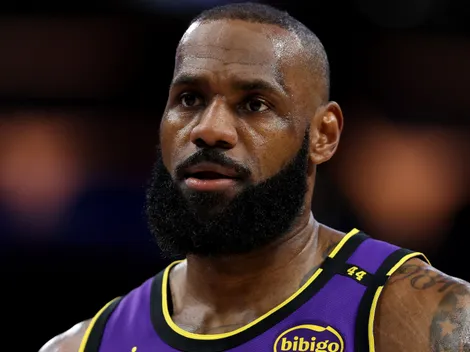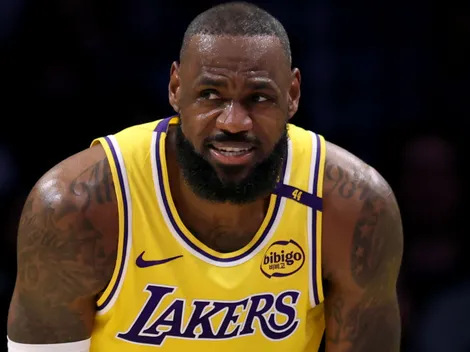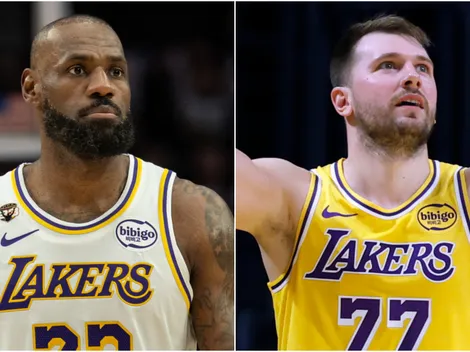The NBA, home to countless sporting feats, has witnessed records that defy logic and imagination. Some of these achievements, due to their magnitude and uniqueness, seem destined to remain unreachable.
From Wilt Chamberlain‘s 100 points in 1962 to Scott Skiles‘ 30 assists in 1990, these milestones not only reflect individual excellence but also the evolution and limits of professional basketball.
In this journey, we will explore some of the most iconic records that, due to their exceptional nature, may remain unbreakable in history, according to sources such as the official NBA website, Fox Sports and more.
Wilt Chamberlain’s 100-point game

Wilt Chamberlain (Source: @NBA)
On March 2, 1962, Wilt Chamberlain, one of the most dominant players in NBA history, left an indelible mark on basketball by scoring 100 points in a single game, leading the Philadelphia Warriors to a victory over the New York Knicks (169-147). The game took place in Hershey, Pennsylvania, in a small gymnasium and in front of a modest audience.
His feat was not only a demonstration of his extraordinary athletic ability but also of his incredible physical and mental endurance. During that season, he averaged 50.4 points per game—an achievement in its own right.
In this particular game, Wilt was unstoppable: he made 36 of his 63 field goal attempts and hit 28 of his 32 free throws, an impressive feat given his reputation as an inconsistent free-throw shooter.
Context matters as well: the rules and defenses of the era allowed Chamberlain, with his imposing height and strength, to dominate opponents. In today’s game, with much more structured defenses and physically comparable players, it is considered virtually impossible for anyone to come close to scoring 100 points in a single game.
Kareem Abdul-Jabbar’s all-time scoring record

Kareem Abdul-Jabbar (Source: @LegionHoops)
For 20 seasons in the NBA, Kareem Abdul-Jabbar set the standard for longevity and excellence, amassing a total of 38,387 points. His success was the result of a combination of factors: his technical skill, physical preparation, and, of course, his legendary “skyhook”, a virtually unblockable shot that became his most lethal weapon.
He played for the Milwaukee Bucks and the Los Angeles Lakers, demonstrating impressive consistency throughout his career. In 19 of his 20 seasons, he averaged at least 20 points per game. His work ethic and ability to adapt to the physical challenges of aging kept him a dominant force on the court even in the later years of his career.
Although LeBron James surpassed this record in February 2023, his milestone remains monumental. It represents not only an extraordinary scoring ability but also the capacity to stay healthy and competitive for two decades, something that remains extremely challenging in the current NBA landscape.
Bill Russell’s 11 NBA championships

Bill Russell (Source: @sportstreeltd)
Bill Russell is synonymous with team success. During his career with the Boston Celtics, he led the team to 11 championships in 13 seasons, an achievement that seems unattainable in modern NBA. His impact went far beyond the stats: he was a master of defense, a relentless rebounder, and a leader who understood how to maximize collective talent.
In an era when the league had fewer teams and a less competitive structure than today, he and the Celtics dominated through a disciplined system designed by coach Red Auerbach. However, the level of pressure these teams faced should not be underestimated. Winning year after year requires unparalleled focus and cohesion, qualities that Russell exemplified.
In today’s NBA, with more balanced teams and players frequently changing franchises, it’s almost impossible to imagine anyone surpassing this record of championships.
John Stockton’s career assists and steals

John Stockton #12 of the Utah Jazz dribbles in Game five of the Western Conference Quarterfinals against the Sacramento Kings during the 2003 NBA Playoffs. (Source: Jed Jacobsohn/Getty Images)
John Stockton, who spent his entire career with the Utah Jazz (1984–2003), redefined what it means to be a point guard. Stockton wasn’t the most athletic or the fastest player, but his basketball IQ, precision, and endurance allowed him to set nearly untouchable records.
With 15,806 assists, he became the greatest playmaker in NBA history. His connection with Karl Malone was legendary, forming one of the most effective duos of all time. Additionally, his ability to anticipate defensive plays made him the all-time leader in steals, with 3,265.
What makes these records even more impressive is his durability: Stockton was rarely injured and played 19 nearly full seasons, an extremely rare feat in modern basketball. In a game where the roles of point guards have shifted toward scoring, it’s hard to imagine anyone breaking these records.
The Boston Celtics’ 8 consecutive championships

Confetti falls after the Boston Celtics 106-88 win against the Dallas Mavericks in Game Five of the 2024 NBA Finals at TD Garden on June 17, 2024. (Source: Adam Glanzman/Getty Images)
During the 1960s, the Boston Celtics established an unprecedented dominance in the NBA, winning eight consecutive championships under the leadership of Bill Russell and coach Red Auerbach. This achievement defined an era in which the Celtics were not only the most talented team but also the most cohesive, emphasizing teamwork and defense.
The team’s core included elite players like Bob Cousy, John Havlicek, Sam Jones and, of course, Russell, who anchored the defense with his shot-blocking ability and rebounding control. Their success was also aided by the NBA’s structure at the time: with only 8–14 teams in the league, talent was more concentrated.
In today’s NBA, parity and frequent player movement make this level of dominance nearly impossible. Teams like the Golden State Warriors have had impressive runs in recent years, but even they have not come close to matching this historic hegemony.
LeBron James’ career playoff appearances

LeBron James #6 of the Los Angeles Lakers reacts during the third quarter in game one of the Western Conference Semifinal Playoffs against the Golden State Warriors at Chase Center on May 02, 2023. (Source: Ezra Shaw/Getty Images)
LeBron James, widely regarded as one of the greatest players of all time, achieved an incredible feat by leading his teams (Miami Heat, Cleveland Cavaliers) to 8 consecutive Finals between 2011 and 2018. This record not only highlights his individual talent but also his ability to elevate his teammates’ performance during the most crucial part of the season.
During this streak, he faced fierce competition, including the Golden State Warriors dynasty. However, his consistency and adaptability to different playing systems allowed him to dominate the Eastern Conference year after year.
In today’s NBA, greater parity, with stars spread across multiple teams, combined with factors like injuries and workload management, makes it unlikely for anyone to match LeBron’s Finals consistency.
Julius Erving’s 30,000 career minutes played

Julius Erving (Source: @NBA)
Julius “Dr. J” Erving is remembered not only for his electrifying style and ability to popularize aerial play but also for his durability on the court. Playing in both the ABA and the NBA, he logged over 30,000 minutes in his professional career.
What makes this achievement remarkable is how he maintained a high level of excellence in an era when training and recovery methods were far less advanced than they are today. His ability to avoid major injuries and remain productive over so many seasons is a testament to his physical preparation and basketball intelligence.
In today’s NBA, where load management and scheduled rest are common, reaching such a milestone seems out of reach for most players. Erving’s longevity remains a lesson in professionalism and resilience.
Wilt Chamberlain’s 50.4 points per game (1961-62)

Wilt Chamberlain (Source: @PasionBasketNBA)
The 1961-62 season was a masterpiece for Wilt Chamberlain, who averaged the astounding figure of 50.4 points per game. This record, like his 100-point game, illustrates his absolute dominance in an era where his combination of height, strength and skill was unmatched.
Chamberlain played a total of 80 games that season, scoring more than 4,000 points in total, a feat that no player has since repeated. Furthermore, he achieved this in an era without a three-point line, meaning all of his points came from field goals and free throws.
The modern context makes this record completely unattainable. With more structured defenses, a different pace of play, and the need to distribute the ball among multiple stars on a team, no player can accumulate such disproportionate figures over an entire season.





